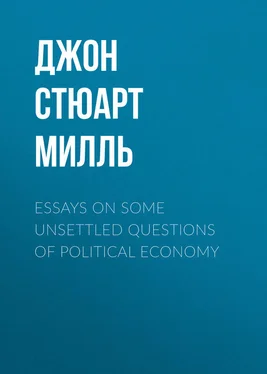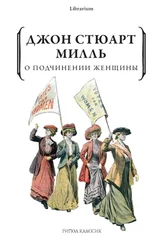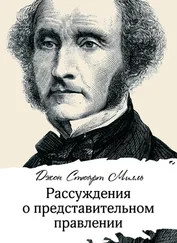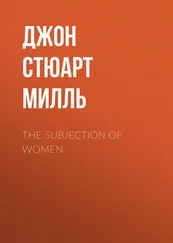Джон Милль - Essays on some unsettled Questions of Political Economy
Здесь есть возможность читать онлайн «Джон Милль - Essays on some unsettled Questions of Political Economy» — ознакомительный отрывок электронной книги совершенно бесплатно, а после прочтения отрывка купить полную версию. В некоторых случаях можно слушать аудио, скачать через торрент в формате fb2 и присутствует краткое содержание. Жанр: Философия, literature_19, foreign_antique, foreign_prose, на английском языке. Описание произведения, (предисловие) а так же отзывы посетителей доступны на портале библиотеки ЛибКат.
- Название:Essays on some unsettled Questions of Political Economy
- Автор:
- Жанр:
- Год:неизвестен
- ISBN:нет данных
- Рейтинг книги:4 / 5. Голосов: 1
-
Избранное:Добавить в избранное
- Отзывы:
-
Ваша оценка:
- 80
- 1
- 2
- 3
- 4
- 5
Essays on some unsettled Questions of Political Economy: краткое содержание, описание и аннотация
Предлагаем к чтению аннотацию, описание, краткое содержание или предисловие (зависит от того, что написал сам автор книги «Essays on some unsettled Questions of Political Economy»). Если вы не нашли необходимую информацию о книге — напишите в комментариях, мы постараемся отыскать её.
Essays on some unsettled Questions of Political Economy — читать онлайн ознакомительный отрывок
Ниже представлен текст книги, разбитый по страницам. Система сохранения места последней прочитанной страницы, позволяет с удобством читать онлайн бесплатно книгу «Essays on some unsettled Questions of Political Economy», без необходимости каждый раз заново искать на чём Вы остановились. Поставьте закладку, и сможете в любой момент перейти на страницу, на которой закончили чтение.
Интервал:
Закладка:
But in general there will not be this extreme inequality in the degree in which the demand in the two countries varies with variations in the price. The advantage will probably be divided equally, oftener than in any one unequal ratio that can be named; though the division will be much oftener, on the whole, unequal than equal.
2. We shall now examine whether the same law of interchange, which we have shown to apply upon the supposition of barter, holds good after the introduction of money. Mr. Ricardo found that his more general proposition stood this test; and as the proposition which we have just demonstrated is only a further developement of his principle, we shall probably find that it suffers a little, by a mere change in the mode (for it is no more) in which one commodity is exchanged against another.
We may at first make whatever supposition we will with respect to the value of money. Let us suppose, therefore, that before the opening of the trade, the price of cloth is the same in both countries, namely, six shillings per yard 2 2 The figures used are of course arbitrary, having no reference to any existing prices.
. As 10 yards of cloth were supposed to exchange in England for 5 yards of linen, in Germany for 20, we must suppose that linen is sold in England at four shillings per yard, in Germany at three. Cost of carriage and importer's profit are left as before, out of consideration.
In this state of prices, cloth, it is evident, cannot yet be exported from England into Germany. But linen can be imported from Germany into England. It will be so, and, in the first instance, the linen will be paid for in money.
The efflux of money from England, and its influx into Germany, will raise money prices in the latter country, and lower them in the former. Linen will rise in Germany above three shillings per yard, and cloth above six shillings. Linen in England being imported from Germany, will (since cost of carriage is not reckoned) sink to the same price as in that country, while cloth will fall below six shillings. As soon as the price of cloth is lower in England than in Germany, it will begin to be exported, and the price of cloth in Germany will fall to what it is in England. As long As the cloth exported does not suffice to pay for the linen imported, money will continue to flow from England into Germany, and prices generally will continue to fall in England, and rise in Germany. By the fall, however, of cloth in England, cloth will fall in Germany also, and the demand for it will increase. By the rise of linen in Germany, linen must rise in England also, and the demand for it will diminish. Although the increased exportation of cloth takes place at a lower price, and the diminished importation of linen at a higher, yet the total money value of the exportation would probably increase, that of the importation diminish. As cloth fell in price and linen rose, there would be some particular price of both articles at-which the cloth exported, and the linen imported, would exactly pay for each other. At this point prices would remain, because money would then cease to move out of England into Germany. What this point might be, would entirely depend upon the circumstances and inclinations of the purchasers on both sides. If the fall of cloth did not much increase the demand for it in Germany, and the rise of linen did not diminish very rapidly the demand for it in England, much money must pass before the equilibrium is restored; cloth would fall very much, and linen would rise, until England, perhaps, had to pay nearly as much for it as when she produced it for herself. But if, on the contrary, the fall of cloth caused a very rapid increase of the demand for it in Germany, and the rise of linen in Germany reduced very rapidly the demand in England from what it was under the influence of the first cheapness produced by the opening of the trade; the cloth would very soon suffice to pay for the linen, little money would pass between the two countries, and England would derive a large portion of the benefit of the trade. We have thus arrived at precisely the same conclusion, in supposing the employment of money, which we found to hold under the supposition of barter.
In what shape the benefit accrues to the two nations from the trade, is clear enough. Germany, before the commencement of the trade, paid six shillings per yard for broad-cloth. She now obtains it at a lower price. This, however, is not the whole of her advantage. As the money prices of all her other commodities have risen, the money incomes of all her producers have increased. This is no advantage to them in buying from each other; because the price of what they buy has risen in the same ratio with their means of paying for it: but it is an advantage to them in buying any thing which has not risen; and still more, any thing which has fallen. They therefore benefit as consumers of cloth, not merely to the extent to which cloth has fallen, but also to the extent to which other prices have risen. Suppose that this is one-tenth. The same proportion of their money incomes as before, will suffice to supply their other wants, and the remainder, being increased one-tenth in amount, will enable them to purchase one-tenth more cloth than before, even though cloth had not fallen. But it has fallen: so that they are doubly gainers. If they do not choose to increase their consumption of cloth, this does not prevent them from being gainers. They purchase the same quantity with less money, and have more to expend upon their other wants.
In England, on the contrary, general money-prices have fallen. Linen, however, has fallen more than the rest; having been lowered in price, by importation from a country where it was cheaper, whereas the others have fallen only from the consequent efflux of money. Notwithstanding, therefore, the general fall of money-prices, the English producers will be exactly as they were in all other respects, while they will gain as purchasers of linen.
The greater the efflux of money required to restore the equilibrium, the greater will be the gain of Germany; both by the fall of cloth, and by the rise of her general prices. The less the efflux of money requisite, the greater will be the gain of England; because the price of linen will continue lower, and her general prices will not be reduced so much. It must not, however, be imagined that high money-prices are a good, and low money-prices an evil, in themselves. But the higher the general money-prices in any country, the greater will be that country's means of purchasing those commodities which, being imported from abroad, are independent of the causes which keep prices high at home.
3. We have hitherto supposed the carriage to be performed without labour or expense. If we abandon this supposition, we must correct the statement of the case in a slight degree. The prices of the two articles will no longer, when the trade is opened, be the same in both countries, nor will the articles exchange for one another at the same rate in both. Ten yards of cloth will purchase in Germany a quantity of linen greater than in England by a per-centage equal to the entire cost of conveyance both of the cloth to Germany and of the linen to England. The money-price of linen will be higher in England than in Germany, by the cost of carriage of the linen. The money-price of cloth will be higher in Germany than in England, by the cost of carriage of the cloth.
The expense of the carriage is evidently a deduction pro tanto from the saving of labour produced by the establishment of the trade. The two countries together, therefore, have their gains by the trade diminished, by the amount of the cost of carriage of both commodities. But here the question arises, which of the two countries bears this deduction, or in what proportion it is divided between them.
At the first inspection it would appear that each country bears its own cost of carriage, that is, that each country pays the carriage of the commodity which it imports. Upon this supposition, each country would gain whatever share of the joint saving of labour would otherwise fall to its lot, minus the cost of bringing from the other country the commodity which it imports. This solution is rendered plausible by the circumstance just now mentioned, that the price of the commodity will be higher in the country which imports it, than in the country which exports it, by the amount of the cost of carriage. If linen is sold in England at a higher price than in Germany, by a per-centage equal to the cost of carriage of the linen, it appears obvious that England pays for the carriage of the linen, and Germany, by parity of reason, for that of the cloth.
Читать дальшеИнтервал:
Закладка:
Похожие книги на «Essays on some unsettled Questions of Political Economy»
Представляем Вашему вниманию похожие книги на «Essays on some unsettled Questions of Political Economy» списком для выбора. Мы отобрали схожую по названию и смыслу литературу в надежде предоставить читателям больше вариантов отыскать новые, интересные, ещё непрочитанные произведения.
Обсуждение, отзывы о книге «Essays on some unsettled Questions of Political Economy» и просто собственные мнения читателей. Оставьте ваши комментарии, напишите, что Вы думаете о произведении, его смысле или главных героях. Укажите что конкретно понравилось, а что нет, и почему Вы так считаете.











